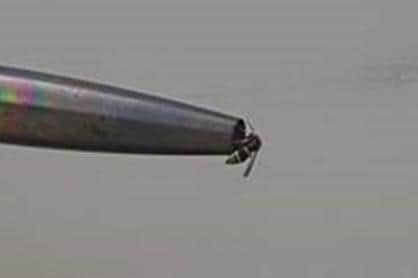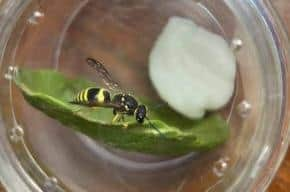Bees and wasps spark system events and rejected take-offs in several airplanes
and live on Freeview channel 276
The AAIB received reports of eight aircraft having been affected by insects between June 9, 2021 and July 19, 2021.
The authority said data problems were caused by insect nests in pitot-static systems and had probably been facilitated by lower than normal aircraft traffic levels during the pandemic.
Advertisement
Hide AdAdvertisement
Hide AdAll of the reported incidents occurred at Heathrow but the Civil Aviation Authority issued a wider safety notice about "pitot blockage events to raise awareness of a possible ‘insect infestation’ issue amongst operators, maintenance, and continuing airworthiness management organisations".


The AAIB states: "Between June 9, 2021 and July 19, 2021, several aircraft suffered from abnormal pitot/static system events, two of which resulted in rejected take-offs.
"The AAIB investigation identified the cause to be the nesting activity of certain species of wasps and bees within pitot probes. This report addresses the likely reasons as to why there was a concentration of such events over a relatively short period of time.
"Although Heathrow Airport and the surrounding area was the focus for these occurrences, detailed information on the environmental factors is provided for the operators of airfields at other locations to take into consideration.
Advertisement
Hide AdAdvertisement
Hide Ad"Safety action has been taken by the CAA and those airline operators affected to reduce the risk of reoccurrence by introducing additional inspections and changes to the use of pitot covers."


According to the AAIB the surge in incidents may have been related to the pandemic. It also warned there is the potential for further incidents this year.
"Insects blocking aircraft pitot/static systems is not a new hazard, but one likely exacerbated at Heathrow in 2021 due to the unusually low operational tempo resulting from the Covid-19 pandemic. Reduced traffic levels and human activity resulted in a surge of insect activity during the pandemic lockdowns.
"With less aircraft activity, including less noise and jet efflux to deter the insects, the parked aircraft made an attractive opportunity, with the pitot probes providing an ideal construction site for nests. The high level of insect activity in 2021 could lead to a larger number of insects emerging in the spring of 2022.
Advertisement
Hide AdAdvertisement
Hide Ad"Therefore, even though traffic levels and aircraft utilisation are expected to increase in 2022, the seasonal risk of insects blocking pitot probes could be significant. Proactive habitat management and aircraft monitoring will be required to mitigate the risk. With the move towards ‘greener’ aviation, this may become even more important in the future," the AAIB said.
Comment Guidelines
National World encourages reader discussion on our stories. User feedback, insights and back-and-forth exchanges add a rich layer of context to reporting. Please review our Community Guidelines before commenting.